Asian Development Bank and India: Fact SheetUpdated yearly, the Asian Development Bank (ADB) Fact Sheet provides social and economic indicators on India, as well as information on ADB operations and contact details. Millions of people from India have benefited from improvements to basic infrastructure and services from ADB-supported development programs. ADB has approved 205 loans totaling $35.1 billion for India, and will continue to support India through the pillars of inclusive growth, environmentally sustainable growth, and regional cooperation and integration. Author: Asian Development Bank Year: 2017 Download Tags: ADB, India, Infrastructure, Regional Cooperation, Sustainability Transport Policies and DevelopmentThis survey reviews the current state of impact assessment of transport investments and policies on growth, inclusion, and sustainability in a developing country context. It reviews the cost and benefits of transport investment and policies in developed countries and discusses challenges in implementing transport interventions in developing countries. Author: Claudia N. Berg, Uwe Deichmann, Yishen Liu, and Harris Selod Year: 2017 Download Tags: Investment, Sustainability, Transport Asian Development Bank and Myanmar: Fact SheetUpdated yearly, this Asian Development Bank (ADB) Fact Sheet provides social and economic indicators on Myanmar, as well as information on ADB operations in the country and contact details. ADB is supporting Myanmar in promoting inclusive and sustainable economic growth, with investments focusing on infrastructure (in energy, transport, and urban and water services), education, and rural development. Regional cooperation will remain one of the key priorities. Author: Asian Development Bank Year: 2017 Download Tags: ADB, Myanmar, Sustainability, Infrastructure, Energy, Transport, Regional Cooperation Asian Development Bank and the Maldives: Fact SheetThis Asian Development Bank (ADB) Fact Sheet provides social and economic indicators on Maldives, and information on ADB operations and contact details. ADB is helping Maldives upgrade commercial and domestic harbors, ensure power supply reliability, boost economic growth, and reduce regional disparities in living standards. Projects in sustainable energy development are helping Maldives achieve carbon neutrality and reduce high fuel costs. Since 1978, ADB has approved 29 loans and grants totaling $248.53 million for Maldives, and has funded 67 technical assistance projects totaling $29.65 million. Author: Asian Development Bank Year: 2017 Download Tags: ADB, Maldives, Energy, Transport, Development, Sustainability 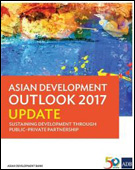 Asian Development Outlook (ADO) 2017 Update: Sustaining Development through Public-Private PartnershipDeveloping Asia is forecast to expand by 5.9% in 2017 and 5.8% in 2018, a slight upgrade from projections in the Asian Development Outlook 2017. However, growth forecast for South Asia is downgraded to 6.7% in 2017. India’s growth remains strong and most South Asian countries are expected to meet or exceed growth forecasts from April. Exceptions are Sri Lanka, where agriculture was affected by drought and floods, and Bhutan, where geological problems have constrained construction on two large hydropower projects. Growth in Nepal surged in 2017 on earthquake recovery but is slowing as agriculture struggles, following severe flooding in August 2017. Inflation forecast in South Asia is lowered to 4.2% for 2017 and 4.7% for 2018. Favorable global commodity prices, good harvests, and prudent macroeconomics are expected. Author: Asian Development Bank Year: 2017 Download Tags: Asia, Development, Sustainability, Public Private Partnerships, South Asia, India, Sri Lanka, Agriculture, Bhutan, Hydropower, Energy, Nepal The Little Green Data Book 2017Based on World Development Indicators 2017 and its online database, the Little Green Data Book 2017 looks at development and the environment through more than 50 indicators for all countries around the world. This edition features indicators on capture fisheries, aquaculture production, and marine-related areas, focusing on the economic importance of fisheries for sustainable development. Author: World Bank Year: 2017 Download Tags: Environment, WB, Development, Sustainability The Internet of Things in the Power Sector: Opportunities in Asia and the PacificAsia’s power sector struggles to upgrade power systems and keep up with growing demand. The Internet of Things (IoT) has the potential to transform the power sector by optimizing operations and lowering costs for consumers. The power sector is already reaping the benefits of adoption of smart meters and smart thermostats, two consumer-oriented IoT applications. The Asian Development Bank has committed to smart grid projects in India, through a Green Energy Corridor and Grid Strengthening Project, and Maldives, through the Preparing Outer Islands for Sustainable Energy Development (Phase 1). Author: Arun Ramamurthy and Pramod Jain Year: 2017 Download Tags: Energy, ADB, India, Maldives, Sustainability Asian Development Bank and Bangladesh: Fact SheetThis Asian Development Bank (ADB) Fact Sheet provides social and economic indicators on Bangladesh, as well as concise information on ADB's operations in Bangladesh and contact information. ADB supports Bangladesh’s efforts to generate inclusive and sustainable growth, and achieve the Sustainable Development Goals. ADB has provided Bangladesh with $18.3 billion for 269 loans, $252.4 million for 422 technical assistance projects, and $787.10 million for 35 grants. ADB supports projects contributing to regional connectivity to foster development along economic corridors and co-finances the SASEC Railway Connectivity: Akhaura-Laksam Double Track Project. Author: Asian Development Bank Year: 2017 Download Tags: ADB, Bangladesh, Economic Cooperation, Energy, Sustainable Development Goals, Sustainability, SASEC Win-Win: How International Trade Can Help Meet the Sustainable Development GoalsThis book aims to demonstrate to policy makers how international trade can contribute to achieving the Sustainable Development Goals (SDGs). Trade can promote income growth, which can then support sustainable development. In addition, there are also direct links between trade and sustainable development, such as trade’s effect on the price and availability of health, education, energy, and other important services. This book maps out a triple-win scenario where good trade policy spurs international trade, contributes to development-friendly outcomes, and helps achieve the SDGs. Author: Matthias Helble and Ben Shepherd, eds. Year: 2017 Download Tags: Bangladesh, India, Maldives, Nepal, Services, South Asia, Sustainability, Sustainable Development Goals Regional Cooperation for Sustainable Energy in Asia and the PacificCountries in the Asia-Pacific region face multiple energy-related challenges, which are driving transformation of energy systems. Addressing these energy challenges is an integral part of implementing the 2030 Agenda for Sustainable Development, including ensuring access to affordable, reliable, sustainable, and modern energy for all. This report analyzes challenges in the Asia-Pacific region and its efforts to accelerate the energy transition to achieve Sustainable Development Goal 7. Author: United Nations Economic and Social Commission for Asia and the Pacific Year: 2017 Download Tags: Asia-Pacific, Energy, Sustainability, Sustainable Development Goals, UNESCAP, Bangladesh, Bhutan, India, Maldives, Myanmar, Nepal, Sri Lanka Eradicating Poverty and Promoting Prosperity in a Changing Asia-PacificThis report explores five long-term trends in the Asia-Pacific region that will shape approaches to poverty alleviation and the prospects for achieving prosperity: regional economic cooperation and integration; rural–urban transitions; demographic changes; ICT access and connectivity; and demand for natural resources. It examines the changing development context in South Asian and other economies. It also looks at opportunities created by regional cooperation and integration that intend to bring about shared economic benefits. Author: United Nations Economic and Social Commission for Asia and the Pacific, Asian Development Bank, United Nations Development Programme Year: 2017 Download Tags: ADB, Connectivity, ICT, Regional Cooperation, Sustainability, UNESCAP, UNDP, Bangladesh, Bhutan, India, Maldives, Nepal, Sri Lanka 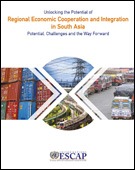 Unlocking the Potential of Regional Economic Cooperation and Integration in South AsiaAt a modest 6% of total trade, intraregional trade in South Asia stands at less than one third of its full potential. Trade barriers and inadequate infrastructure have cost South Asia over US $54 billion per year in lost export opportunities. With 309 million people living on less than $1.90 a day—the largest concentration of poverty in the world—South Asia should urgently pursue broad-based regional economic cooperation that could enable effective responses to the subregion’s developmental challenges. This report examines the state of economic integration in South Asia and identifies potential areas for further strengthening subregional linkages. It provides recommendations on policy actions to increase market integration, improve connectivity, boost investment in infrastructure development, and tackle shared vulnerabilities and risks. It calls for the consolidation and upgrading of existing trade and investment cooperation initiatives into a South Asia Comprehensive Economic Partnership. Author: United Nations Economic and Social Commission for Asia and the Pacific Year: 2017 Download Tags: BIMSTEC, Investment, Regional Cooperation, SAARC, South Asia, Sustainability, Sustainable Development, Trade, UNESCAP, Bangladesh, Bhutan, India, Maldives, Myanmar, Nepal, Sri Lanka Global Energy InterconnectionSustainable energy and climate change are major global concerns, yet three billion people around the world rely on wood, coal, or animal waste for cooking and heating. The interconnection of grids would open up opportunities for resource sharing and bring clean energy to much more of the world. This paper assesses benefits and outlines policy, technical, and economic preconditions for global energy interconnection. It analyzes global transmission scenarios and evaluates their impact on energy supplies and the environment. It also gives recommendations for setting standards, and where stakeholder involvement is necessary. Author: International Electrotechnical Commission Year: 2017 Download Tags: Energy, India, Nepal, Policy, Standardization, Sustainability, Trade, South Asia 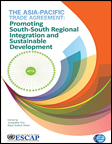 The Asia-Pacific Trade Agreement: Promoting South-South Regional Integration and Sustainable DevelopmentAs countries begin to depend on more each other, trade policy is helping achieve inclusive and sustainable development. Trade and investment are linked to the environment and social issues, and countries now realize that cooperation is necessary in approaching global and regional problems. The Asia-Pacific Trade Agreement (APTA), the oldest preferential trade agreement in the region, helps promote economic development and the adoption of mutually beneficial trade measures. This book gives an overview of the APTA and outlines potential benefits and challenges for members new to the APTA. The book details a possible road map for APTA and suggests that APTA move from the conventional preferential agreement to a comprehensive economic integration agreement by converting to FTAs in goods, services, investment, trade facilitation and non-tariff measures. Author: Joong-Wan Cho and Rajan Sudesh Ratna (editors) Year: 2017 Download Tags: Asia-Pacific Trade Agreement, Bangladesh, India, Sri Lanka, Regional Integration, Sustainability, UNESCAP Renewable Energy Sector in Emerging Asia: Development and Policies (TIID Working Paper No. 1/2017)Rapid economic growth in emerging Asia has led to a critical increase of greenhouse gas emissions. Transitioning to renewable energy sources would help reduce emissions. However, massive investment is needed to make that transition. According to this paper, targeted policy interventions are needed to facilitate trade and investment in the renewable energy sector and create “green jobs” in the low-carbon and resource-efficient sectors. Author: Masato Abe, Candice Lea Marie Branchoux, Jaewon Kim Year: 2017 Download Tags: Bangladesh, Energy, Governance, Hydropower, Employment, India, Myanmar, Sustainability, UNESCAP Trade Facilitation and Global Value Chains: Opportunities for Sustainable DevelopmentThis paper analyzes the relationship between global value chains (GVCs) and trade facilitation, and its contribution to sustainable development outcomes on low-income and least developed countries (LICs and LDCs). A key insight of the paper concludes that it is not fundamentally GVCs that drive the sustainable development implications of improved trade facilitation, but the resulting extension and intensification of economic activity. It underlines the importance of putting in place domestic regulatory infrastructure that considers the appropriate economic, social, and environmental dimensions to ensure that GVCs remain consistent with the global commitment to sustainable development, while expanding economic opportunities of LICs and LDCs. Author: Ben Shepherd Year: 2016 Download Tags: Trade Facilitation, Trade, Global Value Chains, Sustainability, Sustainable Development, Least Developed Countries, LDC Leveraging Urbanization in South Asia: Managing Spatial Transformation for Prosperity and LivabilityAs South Asian economies improve, they have the potential to greatly improve their prosperity and livability for the people of the region by improving their state of urbanization. Messy and hidden urbanization that leads to slums and sprawls is the result of failure to address congestion constraints arising from rapid growth of urban populations. This book examines the state of South Asia's urbanization – it reviews gaps in markets and policies that have hindered its proper growth, and discusses key policy areas that must be undertaken, including improvement in housing provisions, infrastructure, and basic services. Author: Peter Ellis and Mark Roberts Year: 2016 Download Tags: Economic Corridor, Urban Development, Governance, Sustainability, South Asia, Social Services The Little Data Book 2016The Little Data Book 2016 offers a quick reference of World Development Indicators 2016, presenting the latest available data for World Bank member countries and other economies in 214 tables. Regional and income group aggregates are also covered in the 12 summary tables, including South Asia. The book includes selected indicators used to monitor progress toward the Sustainable Development Goals. Author: World Bank Year: 2016 Download Tags: Sustainability, South Asia, Economic Growth Towards a Sustainable Future: Energy Connectivity in Asia and the PacificDespite the benefits of energy connectivity, energy trade in Asia and the Pacific has remained far below its potential. This publication takes a detailed and engaging look at how smart region-wide energy connectivity could greatly improve energy supply and address the environmental impacts of energy. It maps existing energy connectivity in the region, examines ongoing initiatives, and suggests regional action plans that could lead Asia and the rest of the world to a sustainable future. Author: United Nations Economic and Social Commission for Asia and the Pacific Year: 2016 Download Tags: Asia-Pacific, Energy, Environment, Sustainability, Connectivity, UNESCAP Building Firm-level Trade Competitiveness in Emerging EconomiesThis paper -- produced under the E15 Initiative and implemented jointly by the International Centre for Trade and Sustainable Development and World Economic Forum -- seeks to understand the framework of competitiveness and its implications for international trade. It discusses issues related to firm-level competitiveness, including the determinants; quality tools and models to address it, especially in developing economies and small and medium enterprises (SMEs); importance of diffusion and learning with a focus on SME growth; and specific policy interventions to improve firm-level competitiveness. Author: Sharmila Kantha Year: 2015 Download Tags: Firms, SME, Trade, Development, Sustainability, India, South Asia, Energy Clean Energy and Access to Infrastructure: Implications for the Global Trade SystemThis paper focuses on how international trade rules could better accommodate renewable energy trade through fixed infrastructure. It explains the World Trade Organization disciplines relevant to trade in clean energy via fixed infrastructure, in particular General Agreement on Trade in Services disciplines on energy services and General Agreement on Tariffs and Trade transit rules. Finally, it suggests policy options to adopt existing rules to the challenges of integrating clean energy transported via fixed infrastructure. Author: International Centre for Trade and Sustainable Development Year: 2015 Download Tags: Energy, Trade, WTO, India, South Asia, Sustainability, Tariff Economic and Social Survey for Asia and the Pacific: Part 2 – Balancing the Three Dimensions of Sustainable Development: From Integration to Implementation This theme study outlines a conceptual framework, a set of strategies and policy options, and offers perspectives on institutional frameworks for integrating the three dimensions of sustainable development – economic growth, social progress and environmental protection. Regional cooperation is critical in maximizing opportunities for building synergies between the three dimensions. Initiatives at the regional level should consider establishing a regional road map, supporting regional economic integration initiatives, and strengthening regional platforms, including the United Nations and the multilateral system. Author: United Nations Economic and Social Commission for Asia and the Pacific Year: 2015 Download Tags: Asia-Pacific, Economic Integration, Regional Cooperation, Economic Growth, Environment, Sustainability, UNESCAP Key Recommendations: South-Asia Consultation on the Post-2015 Development AgendaThe South Asian Association for Regional Cooperation, the United Nations Development Programme, the United Nations Economic and Social Commission for Asia and the Pacific, and the Asian Development Bank organized the South Asia Consultation on the Post-2015 Development Agenda in Nagarkot, Nepal on 26-28 August 2014. This Nagarkot Statement contains the eight guiding principles for future goals, key messages and recommendations on South Asia’s development priorities, financing for a post-2015 development agenda to support sustainable development, and technology access, including data, monitoring and accountability. Author: United Nations Economic and Social Commission for Asia and the Pacific Year: 2015 Download Tags: South Asia, Sustainability, ICT Policy Enablers for New Wind Energy MarketsThis publication focuses on the wind energy policies that can support sustained development of wind power in emerging wind energy markets. The policies are based on the work done by Quantum Leap in Wind Power Development in Asia and the Pacific (QLW). QLW is a $2 million, 3-year project funded by the Asian Development Bank, to facilitate wind power sector development in developing countries. The success and failures of wind energy policies in Mongolia, the Philippines, and Sri Lanka – including its impact and evolution – are analyzed in this report. Author: Pramod Jain and Bo An Year: 2015 Download Tags: Energy, Asia-Pacific, Sri Lanka, Sustainability, ADB 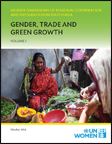 Gender Dimensions of Regional Cooperation in South Asia: Gender, Trade and Green Growth (Volumes I and II)This technical report presents an analysis of the interconnection between gender equality, regional trade and sustainable development in selected areas of four South Asian countries. In general, the report found women's contributions to total exports of all countries to be low, and in green exports to be lower. It identifies constraints and challenges, such as limited training in entrepreneurship, gender stereotypes related to green trade, existing gaps in policy framework, and weak access to technology, hindering women's participation in three green trade industries - agriculture and agro-processing, renewable energy, and ecotourism. The report looks at possible entry points for women, and recommended a list of actions to tap these identified entry points, including the need for greater exchange and cross-fertilization of experience among associations of women entrepreneurs and women’s chambers of commerce in South Asia. Author: Shreyasi Jha, Ritu Dewan, Amee Misra, Saloni Singh, Navanita Sinha, Maheen Sultan and Sonam Tobgay Year: 2014 Download Tags: Gender, Trade, Sustainability, South Asia, Bangladesh, Bhutan, India, Nepal SME Competitiveness and Aid for Trade: Connecting Developing Country SMEs to Global Value ChainsThis joint ITC-WTO study discusses constraints faced by small and medium-sized enterprises (SMEs) in international trade, particularly by least developed countries. It reviews how Aid for Trade addresses these challenges through a sample of 23 Diagnostic Trade Integration Studies. Three bottlenecks emerge – quality of business environment, access to finance, and lack of institutional support to overcome trade-related challenges. This study also highlights actions taken by companies to integrate SMEs into their supply chains and concludes with an analysis of recent private sector program evaluations. Author: International Trade Centre and World Trade Organization Year: 2014 Download Tags: SME, Trade, Private Sector, Small and Medium Enterprises, Bhutan, India, Nepal, Sri Lanka, Sustainability National Trade Facilitation Bodies in the World This UNCTAD publication provides the first, in-depth quantitative analysis of 50 existing national trade facilitation bodies and a first-hand set of recommendations from experiences of participating stakeholders. It offers policy-oriented conclusions to assist countries about to set up or strengthen their national trade facilitation working groups. The study reveals that the biggest challenge for trade facilitation working groups is sustainability. Its determining elements include the administrative culture of each country, level of development, or type of body and geographical region. Author: United Nations Conference on Trade and Development Year: 2014 Download Tags: Trade Facilitation, Trade Policy, Sustainability, UNCTAD, Bangladesh, Bhutan, Nepal, Sri Lanka 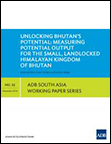 Unlocking Bhutan’s Potential: Measuring Potential Output for the Small, Landlocked Himalayan Kingdom of Bhutan The hydropower sector has driven Bhutan's economic growth in the past two decades with growth rates averaging 7.9%. Yet, the economy has not been invulnerable to market fluctuations and external shocks. This ADB South Asia Working Paper analyzes how Bhutan can create sustainable and inclusive growth, alongside the continuous expansion of its hydropower industry. It examines how certain policies can impact Bhutan's potential growth over 2013–2030. Results show that higher investment in education, health, and efforts to diversify its economic base—including enhancement of new industries with linkages to regional and global value chains—can further drive economic growth and improve the country's living standards. Author: Sabyasachi Mitra, Sarah Carrington, and Anthony Baluga Year: 2014 Download Tags: Bhutan, Energy, Economics, Hydropower, ADB, South Asia, Sustainability, Global Value Chains, Economic Growth 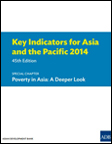 Key Indicators for Asia and the Pacific 2014This year's edition presents an in-depth inquiry on poverty in Asia, tackling whether the $1.25/day extreme poverty standard still accurately depicts minimum living standard of the poor in Asia and the Pacific. Using this broad measure, the poverty rate is projected to fall to 24.5% for South Asia by 2030, if recent economic growth trends continue. However, considering the current national poverty line average among today's less developed economies in the region, an Asia-specific extreme poverty line is more accurately estimated at $1.51/day, increasing Asia’s poverty rate in 2010 by 9.8%, and ��of a large economy like India by 15%. Hence, despite huge gains made, reducing poverty remains a pressing challenge in Asia and the Pacific. This book proposes several measures to counteract worsening poverty, including �close �regional cooperation which can reduce a country’s vulnerability, and urgent policy actions that promote economic growth and prioritize climate change adaptation and mitigation. Author: Asian Development Bank Year: 2014 Download Tags: Poverty Reduction, Disaster Risk, Regional Cooperation, Asia-Pacific, Bangladesh, Bhutan, Economics, Energy, India, Maldives, Milennium Development Goals, Nepal, Sri Lanka, Sustainability, Transport 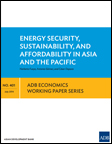 Energy Security, Sustainability, and Affordability in Asia and the PacificEnergy security, sustainability, and affordability from 2010 to 2035 for Asian Development Bank’s Asia and Pacific members are calculated in this working paper, including potential benefits of integrating energy systems regionally. Based on business-as-usual and alternative scenarios, outlook on SASEC member countries by 2035 include (i) dramatic improvement in Bhutan's energy efficiency, (ii) slight decrease in Bangladesh's energy intensity—although carbon dioxide will increase in its primary energy mix, as dependence on fossil fuels rise, and (iii) decrease in energy self-sufficiency of SASEC member countries by 2035, but improved energy affordability. Since renewable energy sources and importation of energy may be capital-intensive, requiring additional tariff support, regional cooperation can enhance affordability and energy security—with Bhutan and Nepal standing to benefit greatly from energy integration in South Asia. Author: Norberto Fueyo, Antonio Gómez, and César Dopazo Year: 2014 Download Tags: Energy, Bhutan, Nepal, Sustainability, Asia-Pacific, ADB, Regional Integration, SASEC, South Asia, Bangladesh, Sustainability, Renewables, Tariff, Regional Cooperation  Energy Security, Sustainability, and Affordability in Asia and the PacificEnergy security, sustainability, and affordability from 2010 to 2035 for Asian Development Bank’s Asia and Pacific members are calculated in this working paper, including potential benefits of integrating energy systems regionally. Based on business-as-usual and alternative scenarios, outlook on SASEC member countries by 2035 include (i) dramatic improvement in Bhutan's energy efficiency, (ii) slight decrease in Bangladesh's energy intensity—although carbon dioxide will increase in its primary energy mix, as dependence on fossil fuels rise, and (iii) decrease in energy self-sufficiency of SASEC member countries by 2035, but improved energy affordability. Since renewable energy sources and importation of energy may be capital-intensive, requiring additional tariff support, regional cooperation can enhance affordability and energy security—with Bhutan and Nepal standing to benefit greatly from energy integration in South Asia. Author: Norberto Fueyo, Antonio Gómez, and César Dopazo Year: 2014 Download Tags: Energy, Bhutan, Nepal, Sustainability, Asia-Pacific, ADB, Regional Integration, SASEC, South Asia, Bangladesh, Sustainability, Renewables, Tariff, Regional Cooperation Evaluating Aid for Trade on the Ground: Lessons from BangladeshThis paper assesses the effectiveness and impact of aid for trade (AfT) in Bangladesh in a series of eight country studies by the International Center for Trade and Sustainable Development. The study argues that the results for AfT are mixed for Bangladesh since it has addressed supply side constraints and contributed to enhancing export competitiveness. However, lack of efficient administrative mechanisms, limited human capacity, and political instability that lead to low absorption capacity limits the overall effectiveness and impact of AfT in Bangladesh. Author: Fahmida Khatun, Samina Hossain and Nepoleon Dewan Year: 2013 Download Tags: Bangladesh, Trade, Aid for Trade, Sustainability, Export, Development, Asia, Gender, LDC, Least Developed Countries Climate Action South Asia: Information Update No. 3 (The Economics of Climate Change in South Asia: Adaptation and Impact Assessment)Analyses show that the cost of early action on climate change in South Asia is lower than
the cost of damage brought about by climate change impacts. In physical terms, the region
will face water shortage and agricultural food production losses, which are vital to achieving
poverty reduction and other Millennium Development Goals (MDGs). Author: Asian Development Bank Year: 2013 Download Tags: Economics, Climate, Agriculture, Climate Change, Environment, South Asia, Milennium Development Goals, Sustainability, Bangladesh, Bhutan, India, Nepal, Maldives, Poverty Reduction, Hydropower, Energy Climate Action South Asia: Information Update No. 2 (Economics of Reducing Greenhouse Gas Emissions in South Asia: Options and Costs)The study Economics of Reducing Greenhouse Gas Emissions: Options and Costs in Bangladesh, Bhutan, the Maldives, Nepal, and Sri Lanka reveals excellent opportunities in low-carbon green growth by pursuing resource- and energyefficient technologies that would lower emissions of greenhouse gases at low cost or even cost saving (benefits). Author: Asian Development Bank Year: 2013 Download Tags: Economics, Climate, Climate Change, Economics, South Asia, Bangladesh, Bhutan, Maldives, Sri Lanka, Energy, Environment, Sustainability, ADB, Nepal, Development, Hydropower Climate Action South Asia: Information Update No. 1 (Development in an Era of Accentuated Climate Risks)To steer South Asian economies toward green, low-carbon, and climate-resilient development and for these to take hold in South Asia, the countries need (i) better understanding and greater public awareness of the implications of climate change, (ii) climate risks screening and decision-support tools for identifying actions and managing results, (iii) improved governance and institutional capacities to take necessary actions to manage climate change impacts, (iv) funding sources for such actions, and (v) projects and programs demonstrating positive results that can be scaled up. Author: Asian Development Bank Year: 2012 Download Tags: Economics, Climate, Climate Change, Environment, Sustainability, South Asia, Development, Economic Growth, ADB |



